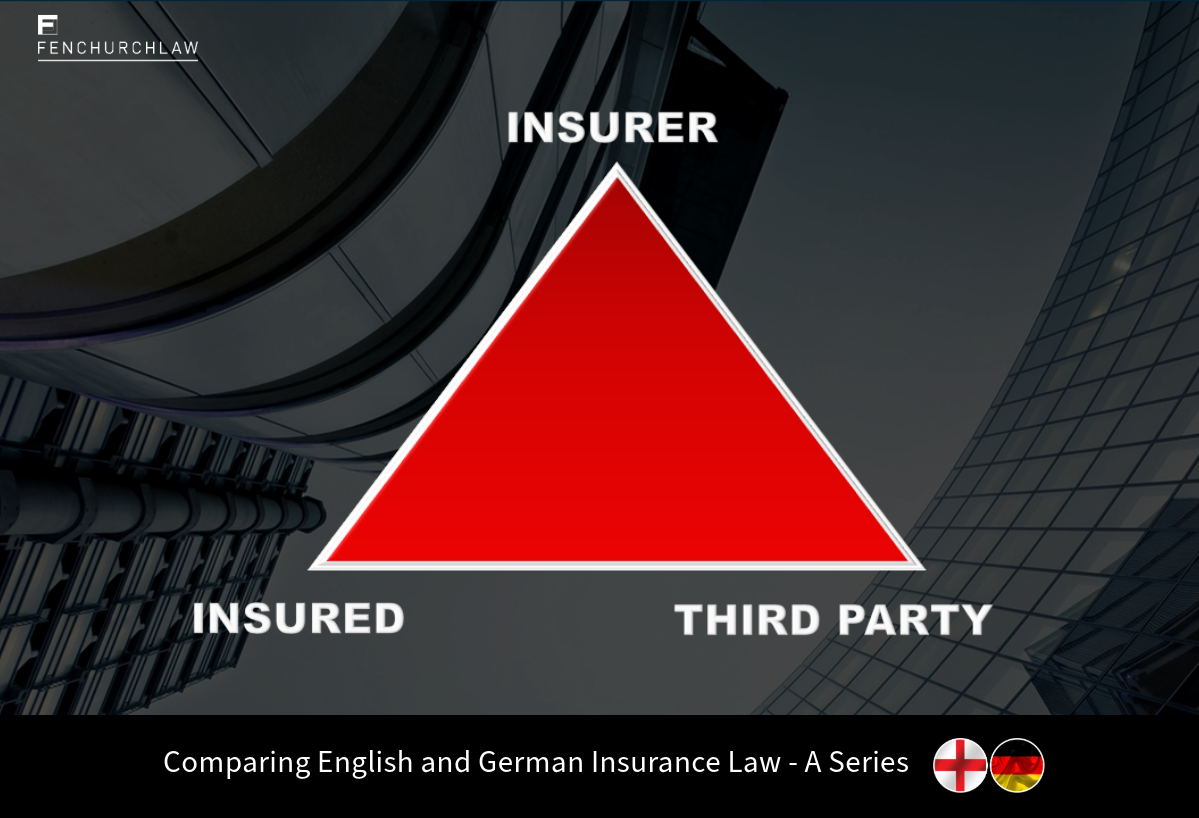
Comparing English and German Insurance Law – Part 2: A Third Party’s Right to Claim Directly Against Insurers
Insurers have deep pockets, while the average person on the street is incapable of paying claims for significant damages. That makes insurers, in most cases, a far more attractive target to claim against compared to the person that caused the damage. This article will give an overview of the different positions in England and Germany with respect to a third party’s right to claim directly against insurers. It focuses on the direct rights which result from statutory law, and does not cover the possibilities to claim against an insurer following a contractually agreed assignment of rights from the insured to the third party.
Insurance and Third Parties
In considering this issue, it is worth looking at the aim of an insurance contract. Typically, insurance is taken out by a policyholder to avoid a situation where it cannot afford to make good what was lost. For example, fire insurance is purchased because the insured wants the insurer to provide the money that is needed to rebuild the home that was burnt down. A doctor takes out professional indemnity insurance to be protected from the financial ruin which would follow if they had to pay compensation for a serious error.
The latter example is different from the former. In the first example, the only parties affected by the insurance contract are the insurer and the homeowner. In the second example, there is another person who has an interest that insurance is taken out: the patient, i.e., the third party.
Thus, depending on the nature of the insurance contract, there might be more than just the insured who has an interest that there is insurance in place. Therefore, it can be said that in some cases, in addition to the obvious purpose of protecting the policyholder from financial ruin, the insurance contract is also meant to provide protection for a third party. This is why in some cases the legislature has decided to make insurance compulsory, with motor insurance being the prime example.
The relevant legislation
There are essentially two pieces of legislation in England which are relevant to this issue: The Third Parties (Rights against Insurers) Act 2010 and the European Communities (Rights against Insurers) Regulations 2002. The latter remains in force following Brexit.
In Germany, the relevant provision is § 115 Versicherungsvertragsgesetz (VVG, “Insurance Contract Act”).
Motor insurance
In both England and Germany, the law provides the victim of a motor accident with a right to claim directly against the liable person’s insurer.
In England, a victim of a motor accident has a direct claim against the driver’s insurers pursuant to regulation 3(2) of the European Communities (Rights against Insurers) Regulations 2002. The right arises when the conditions of the regulations are met. Importantly, the victim must be a resident of one of the EEA states (regulation 2(1)) and the accident must have happened on a road or public place in the UK. Furthermore, the vehicle must be insured according to the requirements of section 145 of the Road Traffic Act 1988 as well as normally based in the UK (regulation 2). As a result, the third party has the exact same rights against the insurers as the insured itself.
The position is in essence the same under German law. Pursuant to § 115 I 1 Nr. 1 VVG, an injured person can directly claim against the liable person’s insurer.
Other liability insurance
For liability insurance other than motor, the laws of both countries differ fundamentally.
England
In England, the relevant Act for other liability policies is the Third Parties (Rights against Insurers) Act 2010. Prior to this Act’s predecessor (the similarly named 1930 Act), it was seen as unjust that a third party that had a valid claim against the insured was left in a vulnerable position in cases where the insured became insolvent: in these instances, any insurance monies went into the general pool for the insured’s general creditors,[i] and often the third party was left without any remedy. The 1930 Act provided, as does the 2010 Act, that the insured’s rights against its liability insurers are transferred to the third party.
The sole trigger for the direct claim against the insurer is that the insured becomes a “relevant person” pursuant to section 1 of the 2010 Act. This term is defined in the Act, but it essentially applies when the insured becomes insolvent. Consequently, in England, a person that suffered loss through the conduct of an insured that has valid liability insurance cover in place can directly claim against the insurers if the insured is insolvent.
Germany
Pursuant to § 115 I 1 Nr. 2 and Nr. 3 VVG, a third party may sue the insurer directly in two additional cases.
First, where the insured is insolvent (Nr. 2) and, secondly, where the insured’s whereabouts are unknown (Nr. 3). However, and this is crucial, § 115 VVG only applies to compulsory liability insurance. A prime example of this in Germany is professional indemnity insurance for lawyers, architects, notaries and doctors. However, there is no obligation to take out PI insurance for construction companies, for example.
As a consequence, a third party that is injured by an insured cannot claim directly against the insurer if the insurance is not compulsory. This differs considerably from English law, where the third party can claim against any liability insurer.
Conclusion
Obviously, the English position is significantly more advantageous to third parties than the German one. The English law is understandable from the point of view of fairness towards injured third parties. Where insurance is in place, why should the third party not be able to assert its claim for damages just because the insurance was not compulsory?
On the other hand, the German position is understandable from a plainly legal perspective: the reason for granting a direct claim reflects the fact that compulsory insurance is ordered for reasons of victim protection. It secures the injured third party a debtor who is willing to negotiate and pay and who is largely insolvency-proof.[ii] Outside of compulsory insurance, the German legislature saw no reason to establish a direct claim by the injured party because a non-compulsory liability insurance policy is taken out by the policyholder solely to protect his own assets in the event that claims for damages are made against him.[iii]
Isabel Becker is a Foreign Qualified Lawyer at Fenchurch Law
[i] Rob Merkin, Lowry, Rawlings and Merkin’s Insurance Law: Doctrine and Principles (4th edn, Hart 2022), 415.
[ii] Official justification of the Federal Government’s draft bill on the Insurance Contract Reform Act of 20 December 2006, Bundestagsdrucksache 16/3945, pp. 50, 88 f.; see also Regional Court of Nuremberg-Fürth, judgement of 21.08.2010, 4 O 2987/09.
[iii] Rüffer/Halbach/Schimikowski, commentary on the VVG, § 115 Rn. 1.



